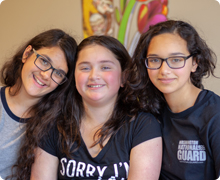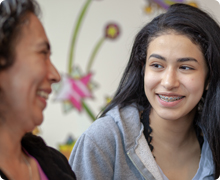OCD Intensive Outpatient Program
What Is the Intensive Outpatient Program for Obsessive-Compulsive Disorder?
 Our program offers therapy 3 hours per day, 4 times a week to help kids with obsessive-compulsive disorder (OCD) break their cycle of fearful thoughts and repeated behaviors. We expose your child to what they fear and teach them different ways to respond. This is called exposure and response prevention (E/RP). Research shows this is very effective. We also teach how you can do exposure exercises at home with your child.
Our program offers therapy 3 hours per day, 4 times a week to help kids with obsessive-compulsive disorder (OCD) break their cycle of fearful thoughts and repeated behaviors. We expose your child to what they fear and teach them different ways to respond. This is called exposure and response prevention (E/RP). Research shows this is very effective. We also teach how you can do exposure exercises at home with your child.
Most kids attend our OCD Intensive Outpatient Program for 8 to 12 weeks. The program meets in Seattle at Seattle Children's Magnuson.
Families have seen great changes in their child as a result of the program. See how our program helped Eva break free from OCD.
Who Can This Program Help?
Children and teens with OCD keep thinking that something is wrong, dirty or could hurt them. These worries (obsessions) make kids with OCD repeat the same behaviors over and over (compulsions).
Our OCD Intensive Outpatient Program helps children and teens 11 to 18 years old with OCD who either:
- Tried weekly therapy for at least 10 sessions and continue to have severe symptoms.
- Are at risk for an inpatient psychiatric hospitalization or psychiatric residential treatment due to severe OCD.
- Been in an inpatient psychiatric unit or residential treatment and continue to need more intensive services or are at risk to be hospitalized again.
- And have a parent or guardian able to attend each session (4 days per week, 3 hours per day) for the entire program.
We treat children and teens ages 11 to 18 (or senior in high school) diagnosed with OCD who have not been able to make progress in regular outpatient treatment.
What’s special about Seattle Children’s OCD Intensive Outpatient Program?
Experts in our Mood and Anxiety Program will treat your child. We are very experienced at diagnosing and treating children and teens with OCD using this approach:
-
Evidence-based treatment
- We provide cognitive behavior therapy (CBT) for children and teens with OCD. Our main focus is exposure and response prevention (E/RP). During therapy, we expose your child to the thoughts, images, objects or situations that cause them anxiety.
- We show them different ways to act when they feel fear. Over time, their anxiety, such as about dirt or germs, decreases and your child stops doing their compulsions, such as washing hands.
- Research shows that exposure therapy is the most successful treatment for anxiety disorders, including OCD. It is even more effective when combined with medicine for a limited time. Children with severe OCD may need medicine for 12 to 24 months.
- The program runs 3 hours a day, 4 days each week. Most kids take part for about 8 to 12 weeks. It may be a few weeks longer if your child needs more treatment.
-
Care tailored to your child
- You and your child will attend group sessions to learn skills to manage OCD and anxiety. Part of the time you’ll be in a group with 6 kids and their parents. Together, we review exposure homework and strategies for kids and parents to use to treat OCD.
- Part of each day is also spent working one-on-one with a therapist who will help your child through that day’s exposure practice.
- If needed, we will recommend that you meet with our psychiatric provider about your child’s medicine.
After your child completes the program, they return to their current community mental health providers for continued treatment or follow-up, as needed.
-
Partnering with families
Parents and guardians are important members of your child’s treatment team. We need you to take part in the program.
- A parent or guardian attends each session.
- You learn how to practice ER/P at home, in 90-minute group sessions with other parents each week.
- Having a child with OCD can be stressful for the whole family. We can connect you to community resources.
-
Experts in kids and teens
- Our healthcare team is specially trained in how to diagnose and treat children and teens. Kids don’t react to anxiety and medicine in the same way as adults. They need – and deserve – care designed just for them.
- Our experts are focused on how today’s treatment will affect your child as they develop and become an adult.
How to Get Services
 To see if our OCD Intensive Outpatient Program is right for your child:
To see if our OCD Intensive Outpatient Program is right for your child:
- Ask your child’s primary care provider or therapist to refer you for services. If your child is a current patient at Seattle Children’s, ask their provider for a referral to the “OCD Intensive Outpatient Program" and to share the OCD Intensive Outpatient Program flyer.
- Once we receive a referral from your provider, we will contact you to set up an assessment.
- The assessment takes place over 2 meetings. This helps us confirm your child’s diagnosis and decide if this program is the best fit. If a different program would work better for your child, we will suggest other options.
- If the program is a good fit for your child, our insurance department will work to get pre-authorization from your insurance company. Most insurance plans cover the treatment, but many require authorization before your child starts. See answers to common questions about mental health coverage.
- If you already have an appointment, read about:
- What to expect and how to prepare.
- Resources for OCD, such as useful links, videos and recommended reading for you and your family.
Providers, see how to refer a patient.
Who Is on the Team?
Providers in the program include:
- Geoffrey Wiegand, PhD, director, OCD Intensive Outpatient Program
- Kalina Babeva, PhD
- Lisa Barrois, PhD
- Danielle Hyatt, ARNP
Contact Us
For more information, contact the OCD Intensive Outpatient Program at 206-987-2164. If you would like an appointment, ask your child’s primary care provider or therapist for a referral. The program meets at Seattle Children's Magnuson.
Providers, see how to refer a patient.
Paying for Care
Learn about paying for care at Seattle Children’s, including insurance coverage, billing and financial assistance.
In crisis?
If you, your child, family or friend needs help right away, call or text 988. Chat is another option. The 988 Suicide & Crisis Lifeline provides free and confidential support for people in distress, as well as prevention and crisis resources. The Lifeline is available 24 hours a day, 7 days a week in the United States.
Hotlines for Youth (PDF) provides other options for immediate help for children and teens. (Also available in Amharic, Arabic, Russian, Simplified Chinese, Somali, Spanish, Ukrainian and Vietnamese.)